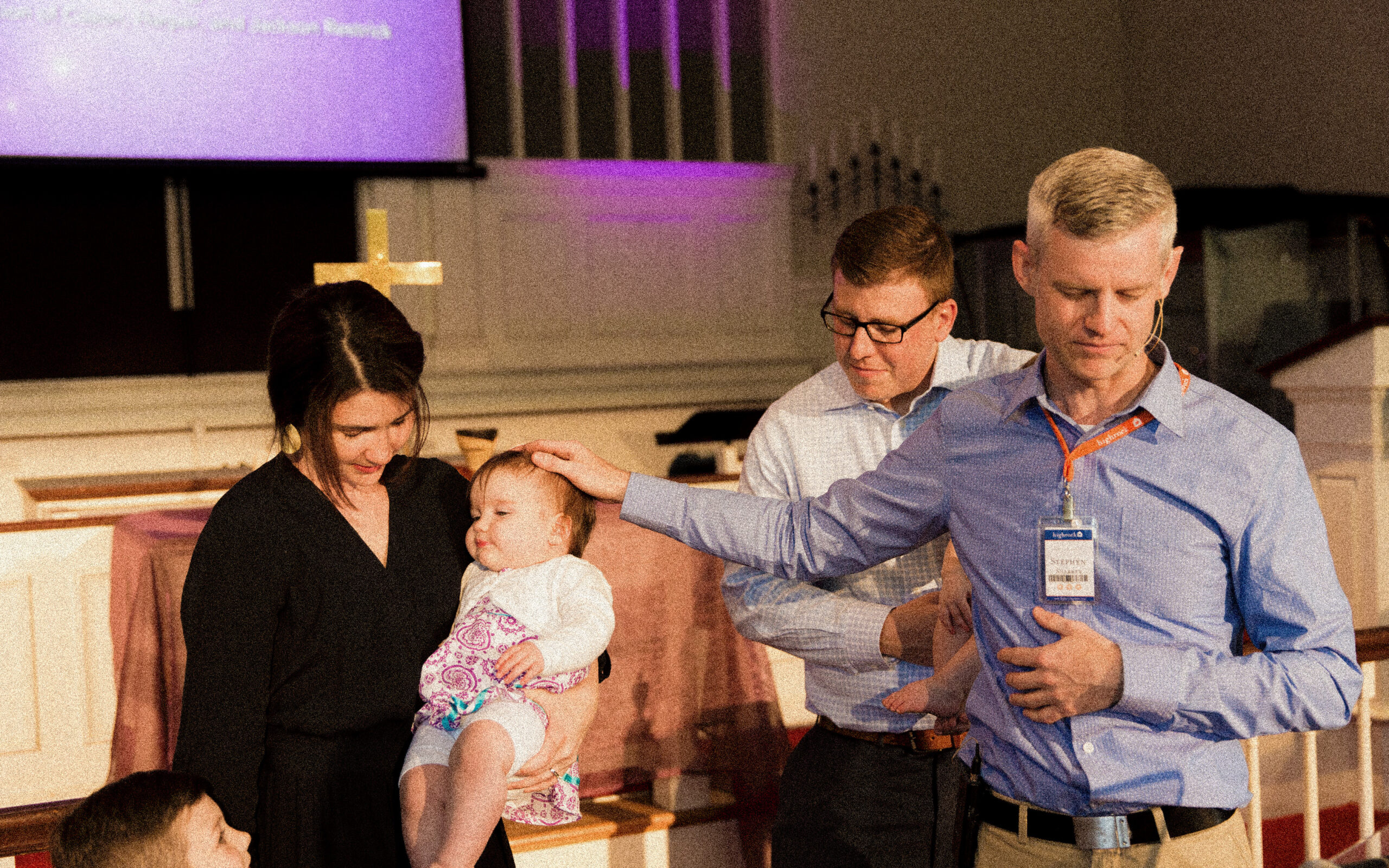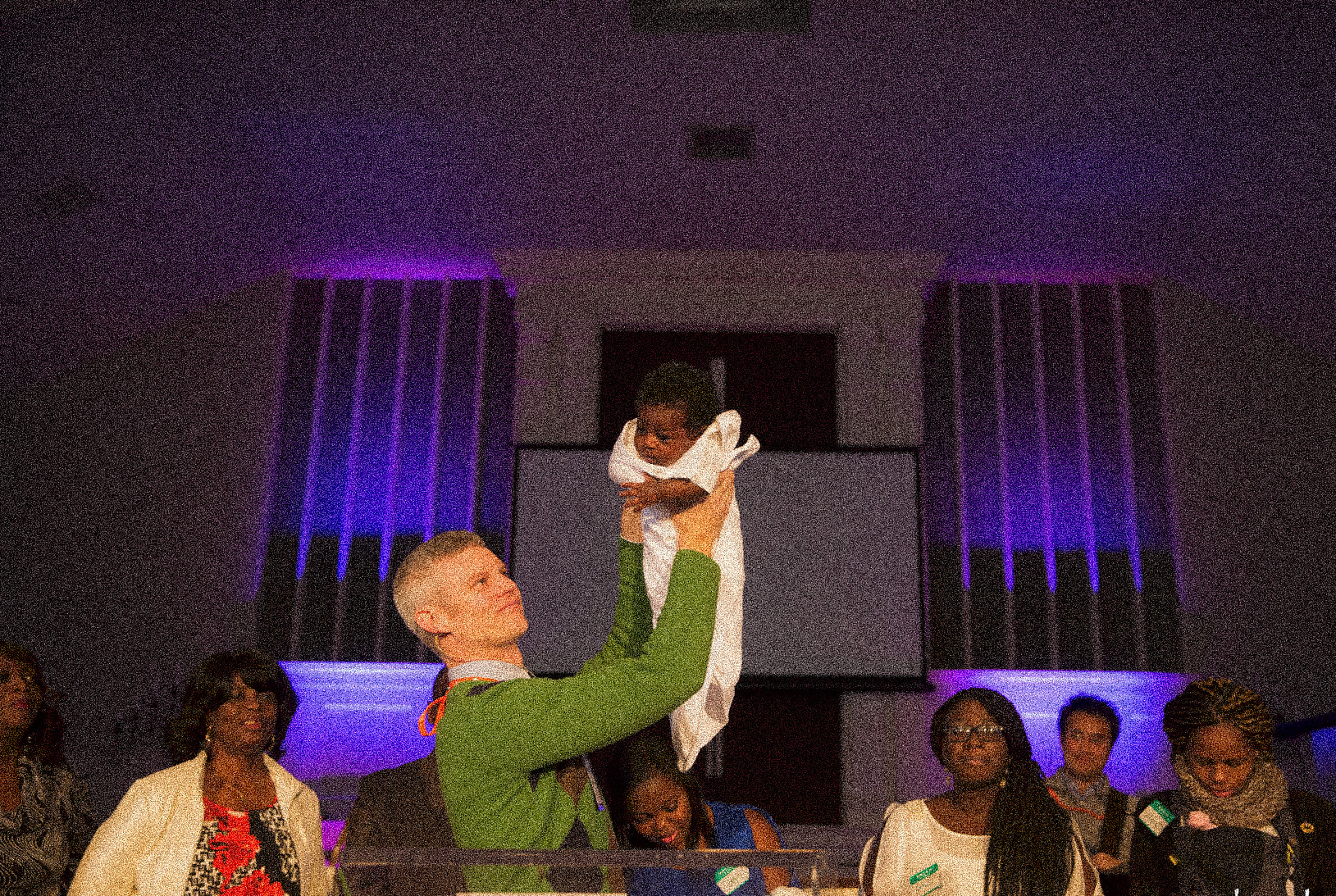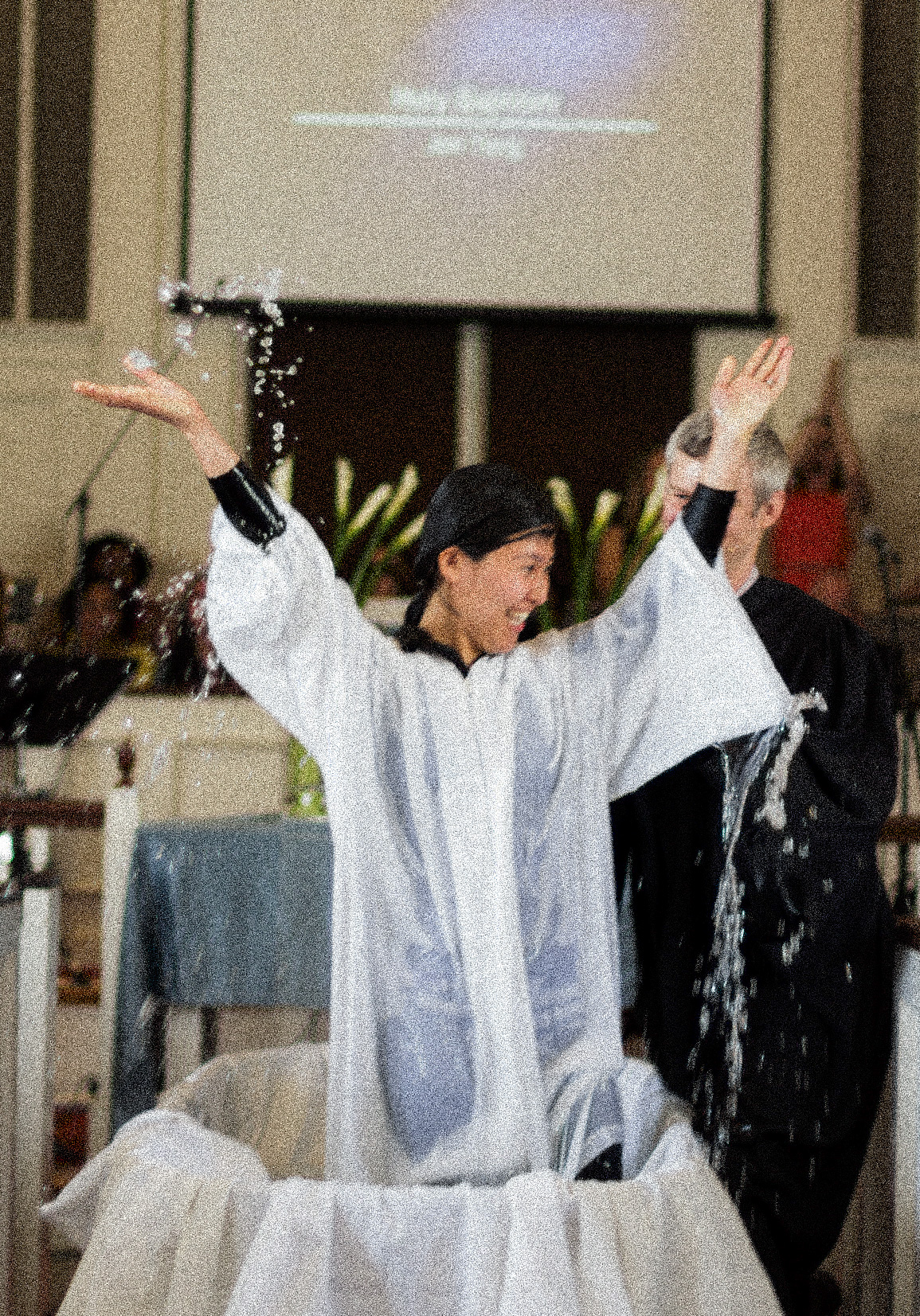What you need to know about baptism
You don't need to have everything figured out to be baptized. You don't need to have a full understanding of the Bible to be baptized. You can even believe things that are wrong, and it's still okay to be baptized. But we often find that people have put off their baptism, sometimes for years, because they're waiting to figure it all out. You don't need to do that.
Baptism is about identifying your life with Jesus Christ in his death and resurrection, and identifying with God's people, the church. You don't need to know everything to do that. You may have never stepped in a church in your life, but if someone invites you to follow the risen Jesus and you say 'yes', you can be baptized. We're more than happy to teach you along your journey, we LOVE doing that. But don't wait to learn everything before being baptized.
There's lots of great info below, and if you're ready to take the important step and be baptized, click the button below to get started.
What is baptism?
The word "baptism" means "to dip," or "submerge," and refers to the practice of submerging new believers in water and lifting them to new life. The practice of baptism wasn’t invented by Christians; Jews were doing it for many centuries before Jesus. But Jews would say that they didn't invent it either; baptism was invented by God Himself.
Baptism is one explicit instruction (ordinance) that Jesus gave to his followers. New life in Jesus consists of repenting of sins, believing in Jesus, receiving the Spirit, being baptized by water, and identifying with God’s community. The idea of an un-baptized or lone-ranger Christian was simply not entertained by the Early Church. Baptism is a public initiation into God’s community.
Baptism is also a sacrament, in the sense that it is an outward sign of an inward invisible grace. It publicly reveals an inward mystery.
Baptism is a one-time-only event. If you've been baptized in the name of Jesus Christ earlier in your life, you don't need to be baptized again. It doesn't matter if you didn't like that church, or if they believed something different about baptism, or if you don't remember it. You don't need to be baptized again. Baptism is about grace. Even if we are believers when we are baptized, we still acknowledge that it was God's grace in our lives that enabled us to turn toward Him.
Baptism has historically been a divisive theological issue in the church, some claiming that infant baptism is right, while others saying that believer baptism is the only way. Because we are a people of the word, and because we see clear avenues for both practices in holy scripture we perform both infant baptism and believer baptism at our church and in our denomination. For those who have been baptized when they were infants, but who have come to embrace believer baptism, we can make an exception for a second water baptism, though we do not believe it is necessary.
What baptism is not
Baptism is not a salvific event. In other words, one does not receive salvation because they are baptized. Salvation comes through Christ alone, and His work on the cross. There is nothing that we can do to receive that salvation except believe in Christ, His death, and His resurrection.
Baptism is not a graduation. You don't get baptized when you've passed a test or learned everything in the Bible. You don't need to have everything figured out, it's simply about identifying yourself with Jesus and God's people.
Baptism is not magic. The waters of baptism are a powerful symbol indicating cleansing and ushering you into a new season of public life with Christ. It doesn't do anything to you. Baptism is an outward expression of an inward truth. It is a public disclosure of God's mysterious grace that is already at work in us before we even say 'yes' to Him.
A biblical overview of baptism
In the Scriptures there is a long history of baptism, and each time baptism resembled death and resurrection. In each instance of baptism, God symbolically raised the baptized to new life; in so doing, He established a people who belonged to Him.
There were three major baptisms in the Old Testament. These events were part of their identity as God's people. The first baptism we see in Scripture is the Flood. Out of the waters that threatened to destroy everyone, God rescued Noah and his family, made a covenant with them and declared them to be His people. The second baptism we read about is the Exodus. After God rescued the Israelites from slavery in Egypt, He led them to the sea where they would have drowned without His intervention. But God led them through the waters to new life on the other side, and again, He made a covenant and declared them His people. We see a third baptism as the Israelites finally prepared to enter the long-awaited Promised Land. Somehow they had to cross the Jordan River in order to enter the Promised Land, so God held back the waters until He’d led them safely to the other side. There they received what God had promised, and once again, He declared them to be His people.
So baptism was always something God initiated — He blessed people with His presence and promises, not because they deserved it, but as the free gift of grace from a God who gives us what we don't deserve.
Ever since, whenever anyone wanted to join the community who worshiped the one true living God, Jews insisted that they be baptized like they were. This symbolized that they were taking on a new identity of people whose old identities had been drowned in death and then raised to new life — born again as God's chosen people.
As we enter the New Testament, John the Baptist is the first person we see baptizing; scandalously, he baptized Jews too. In so doing, he was reminding them that it's not enough to simply be a born into a community that belongs to God; each of us must enter into the identity and inheritance shared by all God's people.
Ever since, whenever new people have come to worship the living God who was revealed in Jesus, they are baptized as a visual expression of the new life that they have received in Jesus. As they descend into the water, we remember that their old identity, sins and ambitions die with Christ — nailed to His cross. As they emerge from the water, we remember that they’ve been born again into new life, into the family of the global church, and into an inheritance prepared for them that will never perish, spoil, or fade. This is not an achievement of any kind; it's a gift we don't deserve, but which we receive because in His grace, God has called us His very own children.
Should I be baptized?
If you consider yourself to be a follower of Jesus and have never been baptized in any form in a Christian church, then yes! You should be baptized. Jesus has commanded it, and there is no reason to wait.
Please note that if you were baptized as an infant, we do consider that a valid baptism and you do not need to be baptized as an adult. However, if you are interested in reconfirming and remembering your baptism publicly, we can discuss ways of pursuing this together.
Can infants be baptized?
Yes. Some people wonder why we baptize babies and infants when clearly they can’t understand these promises or do anything to earn this privilege, but let's not forget, baptism is first and foremost about identity, and even infants by way of their parents faith, can be identified with the person of Jesus and the people of God. Infant Baptism reminds us that baptism is always a gift God gives to those who don’t entirely understand it and haven’t earned it at all. God invites us to be born again as children into His family, makes us promises, and offers us an inheritance that we don’t have to earn. Perhaps it is for this reason that Jesus said (Matt 18:3) "Truly I tell you, unless you change and become like little children, you will never enter the kingdom of heaven." Infant baptism also relies heavily on the biblical idea that grace is prevenient. That means that God's grace precedes our ability to choose God. Where as believers baptism leans more heavily on the idea that we choose Jesus, infant baptism reminds us that God chooses us first (Ephesians 1:4; Romans 8:29; 2 Thessalonians 2:13).
The practice of infant baptism is also widely attested in the history and tradition of the global church. For the early Christians, baptism was more than an individual decision, it was a whole-family event. Even in the early church we see in Acts 16:15 that Lydia's entire household was baptized. This would have included children and servants and all who lived there. This exemplifies the much more communal nature of the ancient world. In many ways the idea of believer baptism is a western individual model based on personal belief, but remember that much of the Christian story comes out of an eastern world that was far more communal, and if the head of a household came to identify themselves with Jesus, then everyone under that roof was identified with Jesus, hence the baptism of all.
With this being said, the Evangelical Covenant denomination is unique in its commitment to maintaining unity within the church with regard to divisive issues that have long standing; as such, the Covenant allows for both infant and believer baptism in local churches. Read more about our denomination’s approach to baptism. In effect, what this is means that we are also open to performing baby dedications at Highrock. Our pastors consult privately with each parent to determine the best mode of devoting your child to God.
For more on the denomination's general perspective on welcoming children into the church, please see this Covenant denominational resource entitled “A Theology of the Child.”
Infant baptism / dedication

In our church, relationship is a high value. We mourn when we see churches split over the doctrine of Baptism, especially since scripture presents clear paths to both infant and believers' baptism. As such, we embrace both of these practices, which have existed throughout the historic church. In both practices, we see Baptism as something that is commanded, but it is not something that saves us. Baptism is both a mark that identifies us with Christ’s church and a practice that reminds us that God’s grace is powerfully present in our lives.
At our church we provide both infant baptism and infant dedication. This is because of our open view of baptism. We baptize both infants and believers. For parents whose convictions lead them to baptize their children as infants we will baptize your child. For parents whose convictions lead them to wait for their children to make that choice on their own, we provide infant dedication as a means of welcoming them into the church.

Why do we dedicate infants?
Two powerful scriptural examples stand out as ancient examples of child dedication. In 1 Samuel we see Hannah bring her son Samuel to the temple for dedication, and she reminds us that children belong first and foremost to God. In Luke 2 Jesus is taken to the temple to be dedicated. These instances show us the power of parents acknowledging the gift of their child and the goodness of God.
The dedication of infants paves the way for their baptism later in life. When children are dedicated their parents and their church community commits to raising them in the way of Jesus and leading them to one day choose baptism for themselves.
Why do we baptize infants?
Some people wonder why we baptize babies and infants when clearly they can’t understand these promises or do anything to earn this privilege, but let's not forget, baptism is first and foremost about identity, and even infants by way of their parents faith, can be identified with the person of Jesus and the people of God. Infant Baptism reminds us that baptism is always a gift God gives to those who don’t entirely understand it and haven’t earned it at all. God invites us to be born again as children into His family, makes us promises, and offers us an inheritance that we don’t have to earn. Perhaps it is for this reason that Jesus said (Matt 18:3) "Truly I tell you, unless you change and become like little children, you will never enter the kingdom of heaven." Infant baptism also relies heavily on the biblical idea that grace is prevenient. That means that God's grace precedes our ability to choose God. Where as believer baptism leans more heavily on the idea that we choose Jesus, infant baptism reminds us that God chooses us first (Ephesians 1:4; Romans 8:29; 2 Thessalonians 2:13).
The practice of infant baptism is also widely attested in the history and tradition of the global church. For the early Christians, baptism was more than an individual decision, it was a whole-family event. Even in the early church we see in Acts 16:15 that Lydia's entire household was baptized. This would have included children and servants and all who lived there. This exemplifies the much more communal nature of the ancient world. In many ways the idea of believer baptism is a western individual model based on personal belief, but remember that much of the Christian story comes out of an eastern world that was far more communal, and if the head of a household came to identify themselves with Jesus, then everyone under that roof was identified with Jesus, hence the baptism of all.
For more on the denomination's general perspective on welcoming children into the church, please see this Covenant denominational resource entitled “A Theology of the Child.”
What's the difference?
Infant Baptism
- Water is applied to the infant.
- Focus is on the sovereign grace of God in baptism which is not bound to time or human merit.
- Focus is on the commitment and present faith of the parents.
Infant Dedication
- No water is applied to the infant.
- Focus is on the gift of the child that God has given to the parents.
- Focus is on the future faith of the child and their future baptism.


